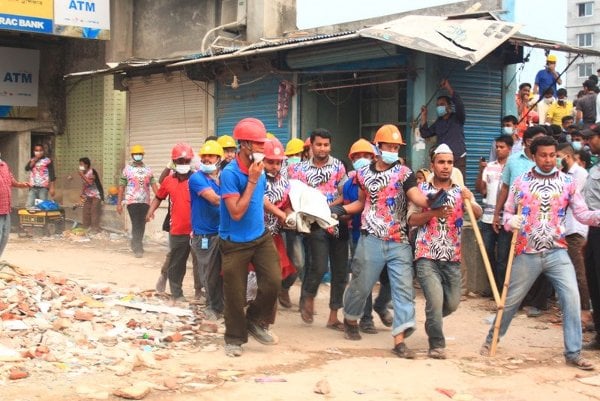Why can't Canada take workplace deaths at least as seriously as Bangladesh does?
Over 40 serious criminal charges were recently laid against garment company owners, managers and government officials in Bangladesh -- a country notorious for sweatshops and labour rights abuses -- following a horrific factory fire that killed more than a thousand workers two years ago.
But despite the annual death toll tied to Canadian worksites, which averages around 1,000 a year, the number of prosecutions against company managers alleged to have made decisions or implemented policies that lead to worker deaths has been minimal, despite the existence of legislation that allows for such prosecutions.
Last year, labour law expert Norm Keith wrote that there have only been 10 prosecutions under the Westray Act since it first became law in 2004. A federal government website that doesn't seem to have been updated since last year indicates that eight such prosecutions have occurred across the country.
No matter which of these figures is accurate, we can be certain, I would suggest, that far more than eight or 10 out of nearly 10,000 workplace fatalities over the past decade can be linked to management negligence.
The Westray Act, passed after a decade of trade union campaigning in the wake of a 1992 Nova Scotia mine disaster tied to management corner cutting, is clearly not being enforced with any real seriousness.
We should all lift up our voices and demand that Canada close this justice gap. We should not be lagging behind Bangladesh on enforcing worker safety laws.
We should be lobbying to insist that Canadian laws that make it possible for criminal charges to be laid in cases of careless management decisions leading to worker deaths be enforced in more than a gestural fashion.
Tragic event not isolated
Two years ago, more than a thousand Bangladeshi workers died in the catastrophic garment factory collapse and fire at the Rana Plaza complex outside Dhaka.
As the ashes cooled and the survivors mourned their losses, it became clear that the factory had been illegally expanded without proper safety procedures prior to the collapse.
Workers said they were coerced into entering the building the day of the collapse, despite evidence that the structure was unsafe. Then, in the wake of a violent explosion, the structure collapsed and filled with smoke and flames, making it impossible for many workers to escape.
This was not an isolated incident. Between 2005 and 2013, nearly 1,500 workers died in Bangladeshi factory fires, and the country's firefighting authorities say that they fought 213 factory fires between 2006 and 2009.
The terrifying number of Rana Plaza deaths, and the horrific pictures that flooded the Internet in the wake of the disaster, led to a robust global campaign demanding reforms led by courageous Bangladeshi activists like Kalpona Akter -- herself a former garment worker and now the executive director of the Bangladesh Centre for Worker Solidarity -- local and international unions, faith groups and non-governmental organizations.
To date the campaign has kept global attention on the issues illuminated by the Rana Plaza flames, compelled some of the retailers who were sourcing garments at Rana (including Canadian giant Loblaw) to join a factory safety organization with enforcement teeth, and motivated corporations to donate to funds for Rana Plaza survivors.
We deserve better
Perhaps Canada needs to be targeted by a similar global campaign. The Westray Act was passed more than a decade ago, and still every year close to 1,000 Canadian workers are killed at work or by illness caused by work-related chemical exposures.
Critical voices in the academic world like the University of Ottawa's Steve Bittle, and trade union campaigns like the United Steelworkers' "Stop the Killing, Enforce the Law," have persuasively argued that many of those deaths are the result of corporate negligence and greed.
The union campaign is lobbying municipalities to endorse a call for better enforcement of the current law. It can point to recent decisions in B.C. to reopen the investigation into the tragic workplace death of Sam Fitzpatrick and to lay Westray Act-related charges in the 2007 death of quarry worker Kelsey Anne Kristian as small steps in that direction.
It is important to note that the charges laid in the Kristian death appear to be the first ever laid in B.C. under the Westray Act, and that the reopening of the investigation into Fitzpatrick's death, which occurred more than half a decade ago, must be credited to the unceasing efforts of his father, Brian, and his trade union supporters rather than to any effective functioning of the law.
We ought to be doing better in Canada than we are on worker safety. The best way we can honour dead and injured workers is by speaking out to our political representatives loudly and often, and by urging them to enforce the existing law and strengthen it with new legislation. A federal election is expected this fall. Let's use the opportunity to make worker safety an issue. ![]()
Read more: Labour + Industry
















Tyee Commenting Guidelines
Comments that violate guidelines risk being deleted, and violations may result in a temporary or permanent user ban. Maintain the spirit of good conversation to stay in the discussion.
*Please note The Tyee is not a forum for spreading misinformation about COVID-19, denying its existence or minimizing its risk to public health.
Do:
Do not: